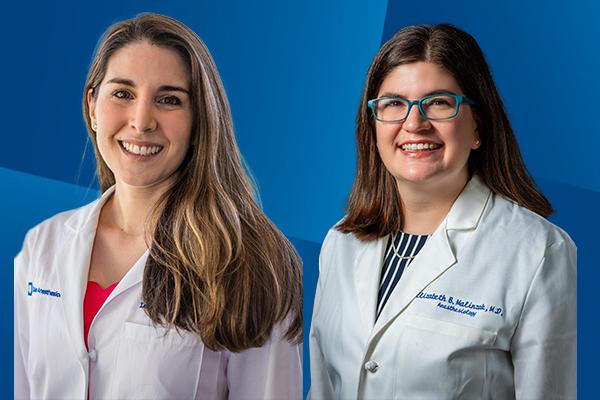
The American Board of Anesthesiology (ABA) and the Foundation for Anesthesia Education and Research (FAER) have selected Duke Anesthesiology’s Elizabeth Malinzak, MD, as the recipient of the 2023 FAER-ABA Research in Education Grant (REG) and Duke Anesthesiology’s Leah Acker, MD, PhD, as the recipient of the 2023 FAER Grant for Early Medical/Surgical Specialists' Transition to Aging Research (GEMSSTAR).
Malinzak was awarded a two-year $100,000 grant for her project titled, “Examining Confidence Ratings in MOCA Minute,” which will examine if a confidence gap exists in anesthesiology board certification requirements. The Research in Education Grant is designed to advance the careers and knowledge of anesthesiologists interested in improving the concepts, methods, and techniques of education in anesthesiology.
The gender confidence gap is a well-known phenomenon that is thought to contribute to attrition of women in the workforce and in leadership. This study will be one of the first to assess the possibility of this occurrence in anesthesiology. It will retrospectively analyze the relationship between answer choice, confidence ratings, and diplomate demographics (gender, age, years of practice, race) in the American Board of Anesthesiology’s MOCA Minute. Additionally, Malinzak will utilize the relevance rating questions for a similar analysis and to determine if there is a correlation between relevance and confidence ratings of questions. The long-term objective is to create a model for future analysis of confidence gaps in various diplomate demographics, and if a confidence gap exists, to determine if it correlates with anesthesiology workforce trends.
“While confidence gaps and its implications are well-studied in social science, there are very few studies examining this area in medicine, and this would be a novel area of research in anesthesiology,” says Malinzak, advisory dean for the Doctor of Medicine program and associate professor of anesthesiology. “I was previously supported by FAER as a medical student and it’s an unreal feeling to have their support again. Additionally, it is wonderful that the ABA recognizes that learning more about confidence gaps could help improve continuing certification materials for anesthesiologists.”
Acker was awarded a two-year $50,000 grant for her project titled, “The Role of the Aging Brain-Heart-Immune Axis in Postoperative Delirium.” The GEMSSTAR will support her two-year National Institutes of Health (NIH) GEMSSTAR grant, which funds her currently enrolling clinical study, “Heart rate variability in Postoperative delirium and Postoperative Inflammatory Endpoints (HiPPIE).” HiPPIE evaluates a multi-organ system framework that Acker developed, the brain-heart-immune axis, as a possible modifiable contributor to poor perioperative outcomes in older adults.
“I am grateful for support from FAER, the NIH, Duke, our department, and—most importantly—our patients who volunteer to participate in research studies,” says Acker, assistant professor in anesthesiology.